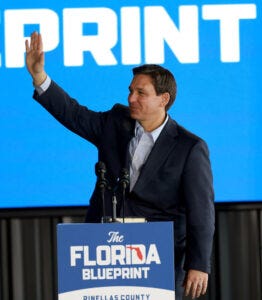The GOP Primary’s Calm Before the Storm
Right now is the perfect time to ask and answer the questions that will decide who is the next GOP presidential nominee
By Seth Moskowitz
In less than 10 months, the GOP presidential primary season will officially kick off with the Iowa caucuses. It seems strange that that’s so long from now: Politics watchers are eager to talk about the primary, but really, nothing much is happening in it right now. Only one new candidate—former Arkansas Governor Asa Hutchinson—has officially entered the race in the last month. No debates are being held, and no votes are being cast. This relative calm before the storm makes it a good time to take a bird’s eye view of the contest and answer some of the most pressing questions that will determine who comes out on top.
1.) What is the Current State of the Primary?
As things stand today, the general outlines of the contest are pretty defined: Donald Trump is the front-runner, Florida Governor Ron DeSantis is his most formidable competitor and the rest of the field is far behind. Trump’s lead is reflected in current polling: The RealClear Politics polling average for the GOP primary indicates that around 50% of would-be GOP primary voters support the former president and 25% support DeSantis, while the rest support someone else, like Nikki Haley, Mike Pence or Tim Scott. On top of this, Trump seems impervious to political scandal, with a floor of around 30% of Republicans who will stick with him no matter what.
Winning? Many of Donald Trump's slate of 2022 midterm candidates--including Arizona Governor candidate Kari Lake--went down in defeat. Image Credit: Mario Tama/Getty Images At present, the non-Trump candidate with the best hope is indeed DeSantis. There was a brief moment following the 2020 midterms where it seemed like DeSantis was even overtaking Trump as the front-runner for the GOP nomination. The contrast in the 2022 midterms between DeSantis’ massive reelection victory in the Sunshine State and Trump’s slate of candidates (including Arizona’s Blake Masters and Kari Lake, New Hampshire’s Don Bolduc, Pennsylvania’s Mehmet Oz and Georgia’s Herschel Walker) losing seemed like it might finally be turning voters away from their former president. But as the sting of the midterms began to fade, Trump had a resurgence in polls that continues to today. That said, DeSantis still has not even declared his candidacy—though that’s expected to change in May or June following the conclusion of Florida’s legislative session.
2.) Will Anything Change When DeSantis Declares His Candidacy?
When DeSantis enters the race later this year, two things will change. First, DeSantis will have to go through a screening process unlike anything he’s experienced before. Running for president entails a level of scrutiny that’s not comparable to running for governor. DeSantis will have to prove his mettle on the debate stage, in interviews and on the stump. He’ll have to survive Trump’s onslaught of attacks and a nation of journalists and opposition candidates conducting opposition research on him. In the past, one mistake has been enough to end presidential campaigns (think Rick Perry or Howard Dean), and DeSantis wouldn’t be the first candidate with exceptionally high expectations to flop once they get on the campaign trail (Scott Walker and Kamala Harris among them). Once DeSantis officially announces, it’ll become clearer whether he has what it takes to survive the biopsy of the soul that is the presidential campaign trail. Second, once he declares his candidacy, DeSantis will have to address Trump directly. Up to this point, DeSantis has mostly avoided going after Trump, opting instead to ignore him most of the time and criticize him only lightly and indirectly. That won’t suffice once DeSantis officially joins the race. Trump will be going after DeSantis, and DeSantis will not have the option of continuing to tiptoe around the former president, especially when they get onto the debate stage. Once he’s in the race, DeSantis will have to make an argument for why he’s a better candidate than Trump, and that means he’ll have to take direct shots at him—and handle the resulting social media fallout. What both of these changes mean is that DeSantis will have to prove himself as a politician, a communicator, a fighter and a leader. Running for president is a completely different ball game from state politics, and there’s no way to know how talented DeSantis is until he’s in the game.
3.) What Should We Make of Recent Polls Showing Trump Pulling Ahead?
There’s no reason Trump’s recent rise in the polls—and DeSantis’ correlated slump—is a result of any fundamental change in the race. It seems more likely that the polls are just registering Trump’s continuing position as the de facto leader of the Republican Party—an underlying dynamic that was always present, but temporarily overshadowed by more fleeting news events. For example, Trump’s polling took a downturn late last year after his handpicked candidates had a poor showing in the midterms and his campaign launch proved uninspiring. But those were ephemeral news stories: They may have hurt Trump temporarily in the polls, but they didn’t do much to impact his support from Republicans in the long term. In other words, DeSantis gaining on Trump last November was the aberration. The reversal of that fleeting gain is a return to the baseline conditions. We should not treat every polling fluctuation as evidence that the fundamental dynamics of the race are changing. Trump’s recovery is proof that Trump is not “finally finished,” as some pundits were declaring late last year. In an alternate universe, perhaps there’s a Trump who never recovered from his midterm embarrassment and continued to bleed support from Republicans ready to move on. But in the real world, Republicans still see Trump as their guy, and that hasn’t changed for the last seven years.
4.) Does Anybody Besides Trump Stand a Chance?
In my opinion, the most helpful mental model for thinking about presidential primaries is “lane” theory. In 2020, for example, Democrats had a “progressive lane” and a “moderate lane.” Throughout the entire primary, moderate lane candidates (Joe Biden, Amy Klobuchar, Pete Buttigieg, etc.) collectively had more support than progressive lane candidates (Bernie Sanders, Elizabeth Warren, etc.). In the end, the strength of the moderate lane over the progressive lane is why Biden was able to overpower Sanders when the contest came down to just the two of them. Going into 2024, the GOP primary also has four discrete lanes: the Trump lane; the not Trump but still MAGA lane; the not Trump, not MAGA lane; and the anti-Trump lane. The first lane is dedicated only to Trump; the second lane is for candidates other than Trump but who still channel the more populist and nationalist spirit he espouses; the third lane is for candidates who don’t openly attack Trump but don’t channel the populist and nationalist spirit; and the fourth lane is for candidates who are openly and aggressively anti-Trump. It’s clear that the majority of Republicans currently fall into one of the first two lanes. One recent poll, for example, found that “nearly 8 in 10 Republican voters (79 percent) consider themselves supporters of the MAGA movement.” The survey also reported that “more than 7 in 10 Republican voters (72 percent) think Trump has had a mainly positive impact on their party, while 21 percent think he has had a mainly negative impact.” With these numbers, it’s hard to imagine anybody explicitly opposed to Trump winning the nomination. That means that a candidate like former New Jersey Governor Chris Christie or New Hampshire Governor Chris Sununu might be able to give Trump a few bruises if they enter the race, but they’re unlikely to win over many GOP voters with that strategy. It’s also difficult, but not impossible, to imagine a more moderate and restrained Republican from the third lane (not Trump, not MAGA) finding success—someone like Senator Tim Scott or former South Carolina Governor Nikki Haley—by coalescing the 20% of Republicans who don’t support the MAGA movement. That wouldn’t be enough to win the nomination, but perhaps would give them footing to launch a serious campaign and make their case to the rest of the Republican base. What seems most likely, though, is that Trump or another avatar of the MAGA movement will win the nomination by bringing together the 80% of Republicans who say they support the MAGA movement. At this point, the front-runner for that non-Trump MAGA spot is Ron DeSantis, and nobody else seems positioned to dislodge him from that spot. In other words, while there’s always a chance that someone other than Trump or DeSantis could win the nomination, it would take some kind of unexpected black swan event that upends the political landscape.
5.) How Could Trump Be Taken Down?
If DeSantis (or another underdog candidate) is going to beat Trump, they’ll need to go about doing so with a careful and deliberate strategy. That strategy will require both a messaging component and a delegate-gathering one.
President DeSantis? Florida Governor Ron DeSantis may try to parlay his wins in the Sunshine State to success on the national stage in 2024. Image Credit: Joe Raedle/Getty Images
On the messaging front, Trump’s opponents should focus on criticizing Trump’s personal failings without going after the movement he built. GOP voters generally approve of the Republican Party’s pivot toward populism and nationalism, so trying to reorient the party back to the 2012 era of Mitt Romney and Paul Ryan would not work. Instead, candidates will have to go after Trump for his temperament and demeanor. Even Trump’s supporters often find his unhinged social media posts off-putting and his reckless behavior unhelpful.
That should be enough fodder for non-Trump candidates to make the case that Trump did some good things as president, but that the Republican Party would be better off if it nominates someone less erratic and more decent than Trump. The way that DeSantis navigated the recent criminal charges against Trump—criticizing the charges as a political hit job while saying that he personally doesn’t “know what goes into paying hush money to a porn star to secure silence over some type of alleged affair”—is a prime example of how to subtly knife Trump without denigrating the political movement he started. On the delegate-gathering side of things, Trump’s opponents should recognize that those states with the earliest primaries and caucuses will be more important than ever. Given the former president’s solid base of national support, his opponents won’t realistically be able to fight him everywhere at once. Instead, their best chance will be to pick up momentum with early state primary wins in Iowa, New Hampshire, Nevada and South Carolina. Expectations for Trump going into those contests will be sky-high, and if he loses (or even comes close to losing), it’ll be seen as a major embarrassment. If one of Trump’s opponents can beat him in those states, they’ll earn the kind of media attention, fundraising capacity and national name recognition that will give them a real chance in the rest of the primary contests. Both the messaging and delegate strategies, however, will require a careful calibration. Trump loves to be the underdog and the outsider, and the other candidates should not gang up on him in a way that allows him to retreat to such a position. Rather than launch an all-out assault on Trump and his supporters, Trump’s competitors will be better off going after him with deft and targeted criticism. In other words, taking Trump out will require a scalpel, not a hammer.
The Murkiness of Political Forecasting
One of the most interesting things about elections is that, in retrospect, results that were once hard to imagine can look inevitable. Today, it might seem like Trump was always going to win the GOP primary in 2016, and that Biden would win the Democratic primary in 2020. But of course, at the time, those outcomes were far from obvious. Most pundits didn’t really believe Trump could be the GOP nominee until he dominated in the New Hampshire primary, and Bernie Sanders was seen as the dominant front-runner as late as March of 2020. In the future, people will probably think that whatever happens in the 2024 GOP nomination was obviously going to happen. “Of course, Candidate X would come out on top, and Candidate Y would flounder!” they’ll say. “The signs were pointing in that direction all along!” But from our position 10 months out from the Iowa caucuses, things are not so obvious. And if you think I’m wrong and that the outcome of the GOP primary is obvious, the betting markets are open for business.




